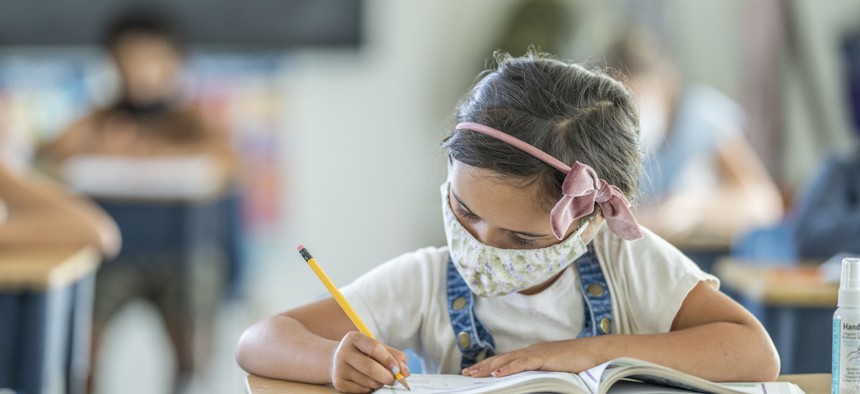“I Wish It Had Not Become Law,” Says Governor Of Mask-Banning Order He Signed Into Law

istock.com/FatCamera
Citing rising numbers of Covid-19 cases among children, Arkansas Gov. Asa Hutchinson called state lawmakers back for a special session to consider allowing school districts to implement mask mandates.
Less than four months after signing a bill prohibiting local mask mandates, Arkansas Gov. Asa Hutchinson reversed course, asking lawmakers on Tuesday to reconsider the policy in a special legislative session.
“In hindsight,” Hutchinson, a Republican, said at a news conference, “I wish it had not become law.”
The order, signed by Hutchinson at the end of April, prohibits state agencies and local entities, including school boards, from mandating masks. Under the policy, officials can only “recommend” face coverings, provided they make it clear “that the recommendation is not mandatory.” The move came after weeks of declining Covid-19 case numbers, which had also prompted Hutchinson to allow Arkansas’ statewide mask mandate to expire.
But Covid-19 cases have since surged. On Tuesday, the state confirmed 2,343 new cases of the virus, bringing its seven-day average to 1,943, more than 10 times the rate at the beginning of June.
And an increasing number of those cases are occurring in children. As of Aug. 1, nearly 19% of the state’s active cases were among residents under the age of 18, said Jose Romero, the state’s health secretary.
“Children that cannot have a vaccine at this point—those under 12—account for more than half of that percentage,” he said at Tuesday’s news conference.
Between April and July, cases in residents under the age of 18 increased by more than 500%; cases among children under the age of 12 went up by 690%, Romero said. Among all children, hospitalizations rose by nearly 270%.
Those numbers were the main driver for Hutchinson’s reconsideration of the mandate prohibition. In a statement, he asked lawmakers to amend the order to allow public school boards and open-enrollment charter schools to “make their own decision to implement masking protocols to protect children younger than 12” in school buildings, buses or other settings where students may gather in close proximity.
“Because of this increased risk of illness in children, we see the necessity of allowing leaders in school districts the flexibility to decide whether students wear masks,” he said. “We must allow local school boards to make the best decision for the students in their schools.”
Only For Schools
During the news conference, Hutchinson reiterated that he is not in favor of another statewide mask mandate—only a provision to allow school districts to make the decisions to protect young students, who can’t be vaccinated unless they are at least 12 years old.
“They are required to go to school. We understand the value of in-classroom instruction, and we want those children to be as safe as possible,” he said. “Local school districts should make the call, and they should have more options to make sure that their school is a safe environment during a very challenging time for education.”
It’s unclear whether lawmakers will go along with the request. Republican leaders in other states, including Gov. Greg Abbott of Texas and Gov. Ron DeSantis of Florida, have doubled down on prohibiting local mask mandates, including those issued by school districts. Hutchinson said he anticipated similar hesitation among Republicans in the Arkansas State Legislature but hoped they would see his request as adhering to the “conservative principle that puts control in the hands of local government.”
“I understand that some legislators are reluctant to allow school boards this freedom, even in this limited way,” he said in a statement. “Some argue it should be up to the parents to decide for the children. For that reason, school boards will have many options after listening to the parents. The goal is to be safe and to keep schools open. Local flexibility will help get us there.”
Kate Elizabeth Queram is a senior reporter for Route Fifty and is based in Washington, D.C.
NEXT STORY: Major Findings From AG’s Report Into NY Gov. Cuomo’s Sexual Harassment





